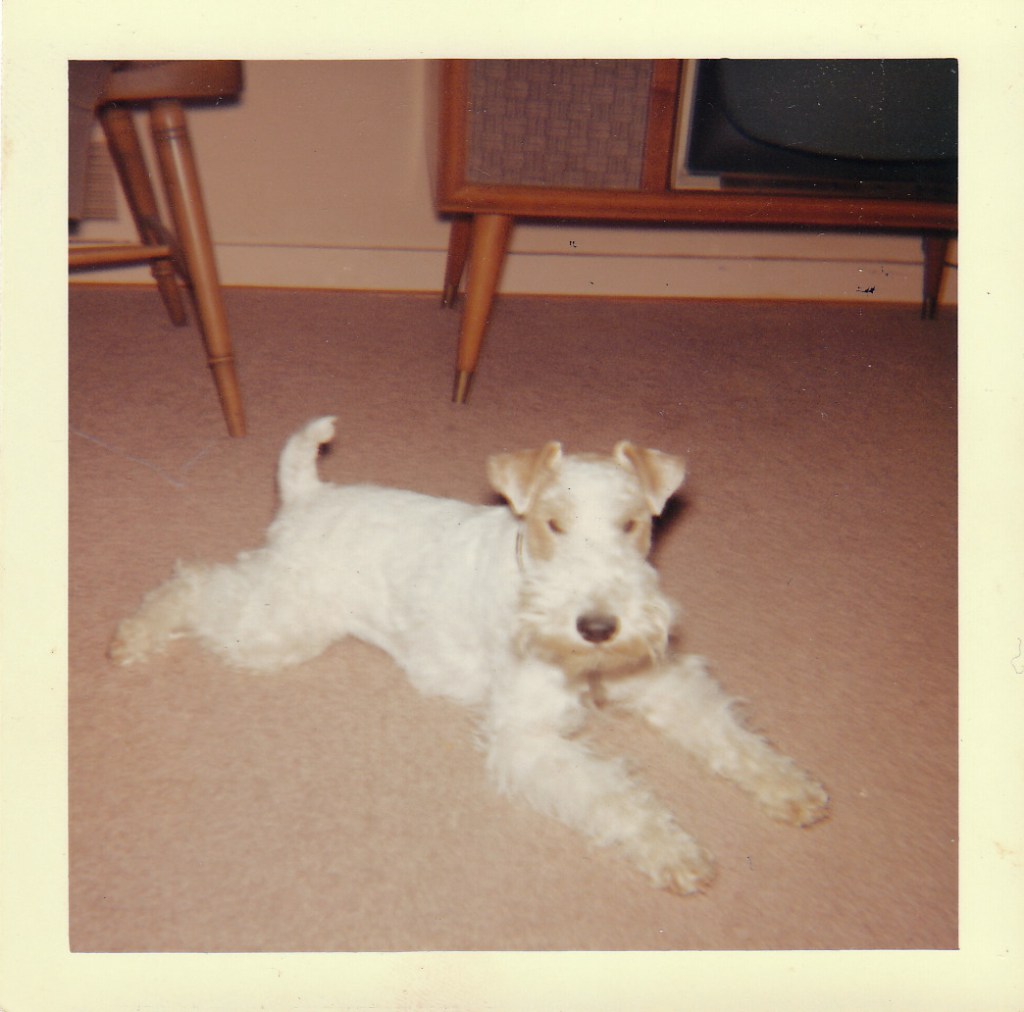When I was a little boy in Houston a cat and a dog lived with us. Lickie the cat was jet black and temperamental, possibly the most catlike cat I ever knew. She wasn’t mean but she wasn’t friendly, either. Other kittens, cats and dogs came and went but Lickie, reaching the ripe age of 21, outlived many of them. She refused to eat anything except Purina #1 canned food.
Skippy came to the family a little before me. Of noble Louisiana breeding and birth, he had a proper name – Squire Skipdale of Nodaway – but he answered to Skippy. I don’t know anything about Wire Fox Terriers beyond what I saw in my ten or twelve years with him, or whether his temperament was standard for the breed, but he was perky without being hyperactive and he didn’t bark too much. He was smart. He knew the usual commands. He’d beg for food, and when you held your hands open and said “All gone,” he’d go away.
I think our dog’s 12-year lifespan was about normal, but he endured in spite of us. Skippy survived so long despite the fact that every Easter, when much of the world celebrated a beautiful, inspirational story of rebirth, we tried to kill him.
My brother and I had a mom who indulged us with holiday candy. On Christmas we would awake to find stockings full of Hershey’s kisses and Pez dispensers, and on Easter morning the spread of sweets was even more elaborate. Big baskets of green plastic grass held malted milk ball eggs, chocolate eggs, solid chocolate bunnies, hollow chocolate bunnies, marshmallow chickens, jelly beans. Candy, candy, candy. We would gorge ourselves until being dragged out to the car and to church.
After church we usually had dinner at our grandparents’ house. We had cousins and sometimes the dinners ran to a dozen people. Often there was ham, or sometimes lamb (which I only learned years later could be served in a color other than gray), and our grandmother Pat liked to put out what she called a relish tray. That confused me because it held black olives out of a can and carrot and celery sticks and little sweet pickles but no relish. Pat was also fond of pickled watermelon rind, which I didn’t love then but for which at this minute I suddenly feel a craving.
Easter afternoons were fun. It wasn’t steamy yet in Houston and we kids could play outside after we ate. Pat had baskets of candy for us, too. She had her own sweet tooth and used the grandkids as an excuse to indulge. The afternoons would end around four or five o’clock, when we’d pack ourselves into the car and head home.
What greeted us when we got there was grotesque. We paused in shock at the front door to survey Shiloh in our own living room. Shredded foil rabbit-wrappers were strewn everywhere. There was so much plastic and torn cardboard that one might have believed a ticker-tape parade had come through. The green plastic grass, which only a few hours before had served as a bed for our candy treasures, was now massed in wet brown clumps, having been swallowed and regurgitated. Skippy apparently had rather catholic tastes in candy, for it seemed that he ate everything from our baskets. Further, based on the contents of the numerous piles and puddles of vomit, he didn’t keep anything down.
I don’t recall learning until much later about the dangers of letting dogs eat chocolate, but these annual binges didn’t seem to do Skippy any lasting physical harm.
One amazing aspect of the Easter adventures with Skippy was the fact that they recurred, year after year after year. When we went to sleep Sunday night our collective memory was erased so that a year later, the same series of events repeated themselves.
I can’t see or eat Easter candy without remembering Skippy.
